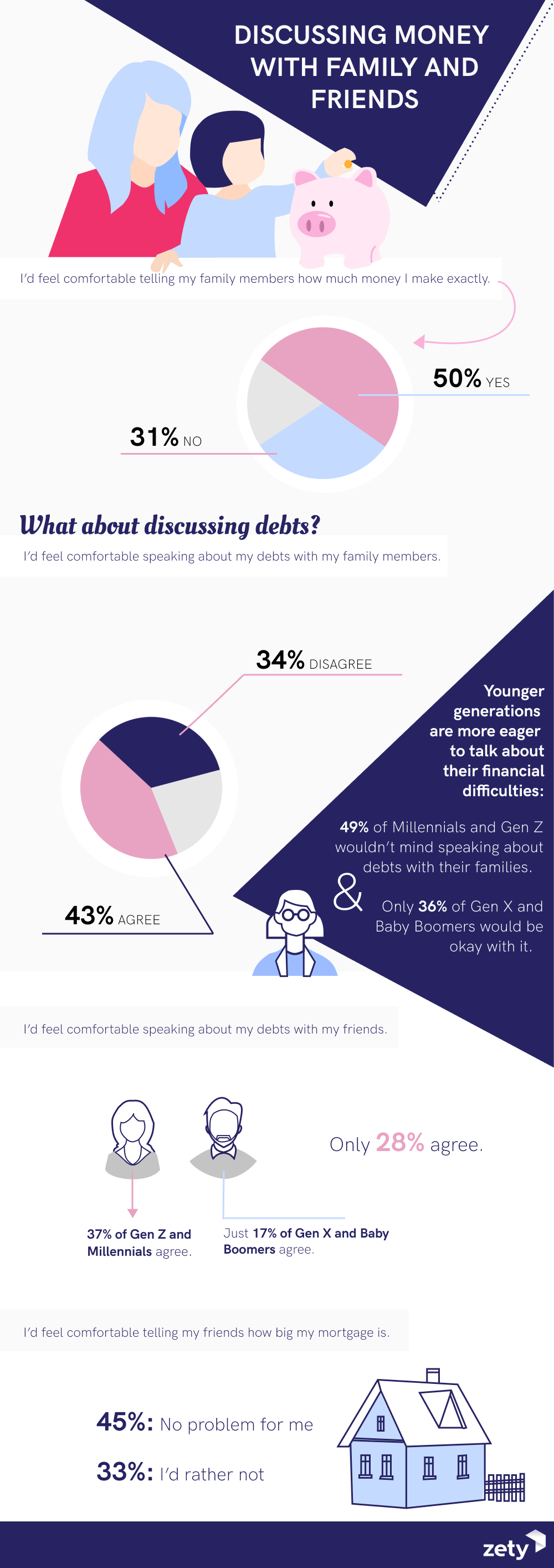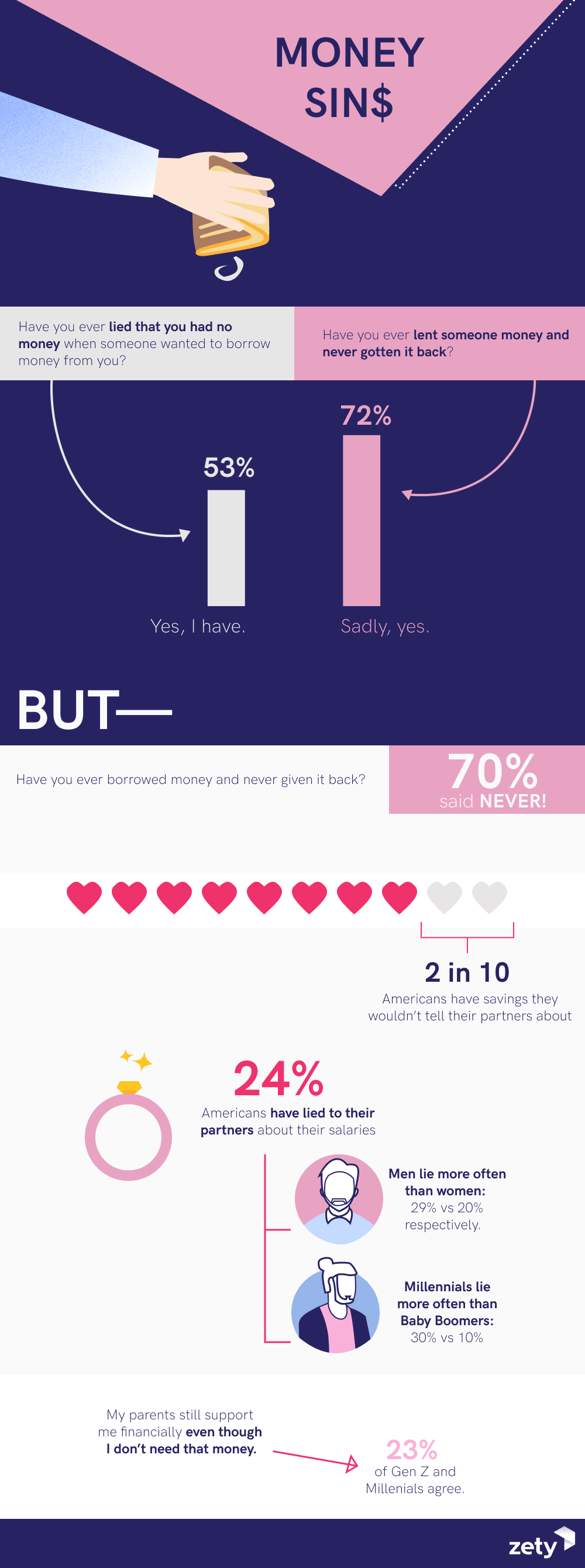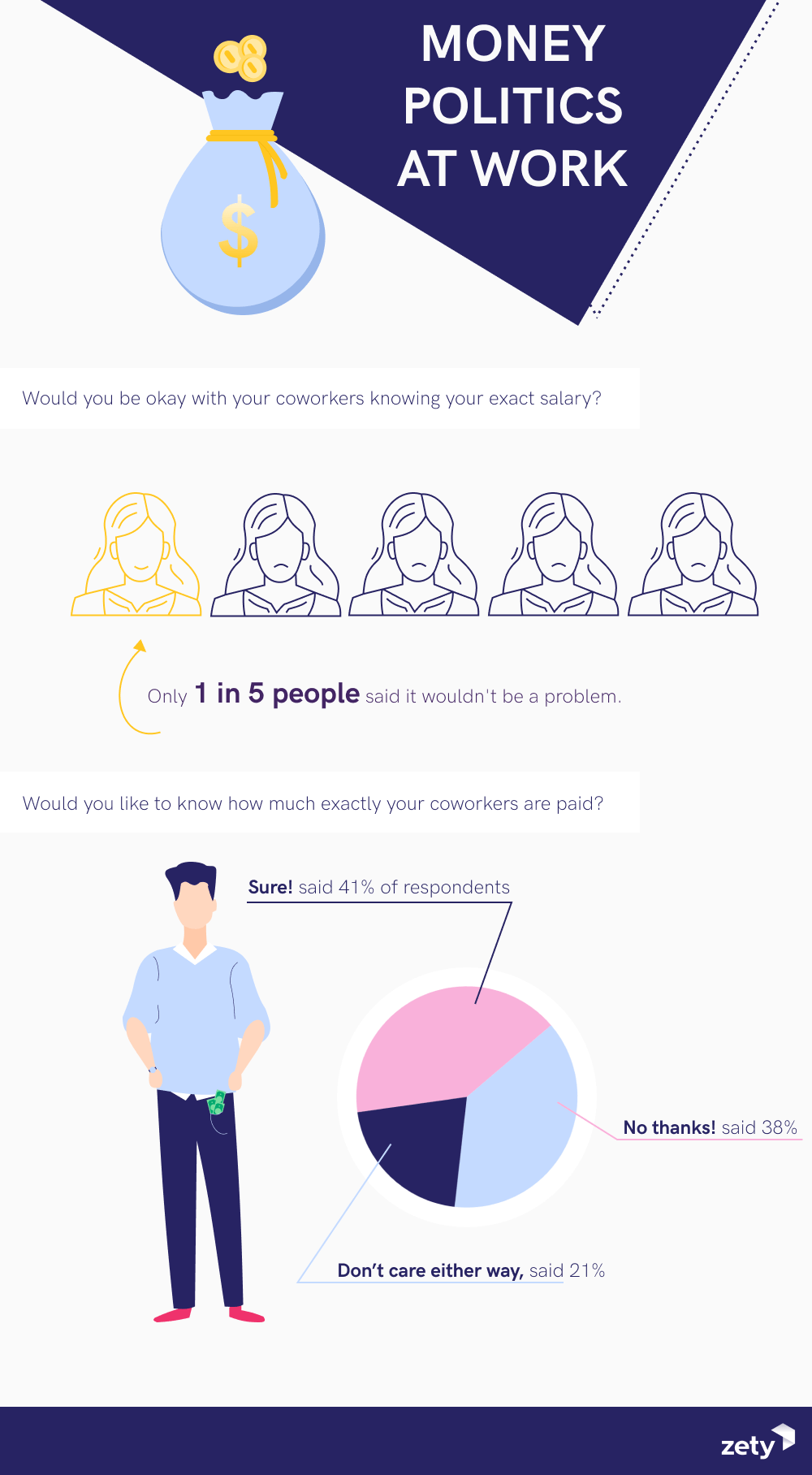Money Talks… But Do We Talk About Money? 2021 Study
Create Your Resume Now
That must have cost a fortune, how can you afford that?!
Just out of curiosity… What’s your credit score?
Cringe overload, right?
No wonder.
Money, quite universally, is considered a taboo subject. Heck, studies have shown that almost 60% of Americans would rather reveal their exact weight than say how much money they have in their savings accounts.
But what if it’s your family that want to talk $$$ with you? What about your life partner? Close friends? Is a relaxed, honest conversation about our financial situation even possible? That’s what we decided to find out.
We’ve asked over 1000 Americans some difficult money questions—do they lie about their salaries? Would they be okay discussing debts? What about revealing mortgages? Read on to see what we discovered.
Friends, Family, Funds

Remember that time you were little and asked your parents how much they earned? They lectured you about how inappropriate that was, didn’t they?
Even today, Americans don’t feel overly comfortable discussing finances with their close ones. Only 50% of respondents said they’d be okay with sharing their exact salary with their family members. It’s harder yet to talk about debts—43% would feel uncomfortable talking with their family members about how much money they owe.
Unsurprisingly, it’s even more difficult to open up about money struggles in a conversation with friends:
- Only 28% of Americans would feel comfortable speaking about their debts with their friends.
- Younger generations are more eager to seek comfort in their pals when struggling with debt: 37% of Gen Z and Millennials feel it’s okay for them to talk about financial obligations with friends compared to only 17% amongst Gen X and Baby Boomers.
What about revealing our real estate financials? That’s more acceptable:
- 45% of respondents think it’s not a problem for them to reveal how big their mortgage is in a conversation with friends (including 52% of Gen Z and Millennials and 37% of Gen X and Baby Boomers).
- For those who don’t own a property, talking about rent is even easier: 57% of respondents wouldn’t mind telling their friends how much rent they pay.
Money talk, you ain’t got none, end of discussion:
- 42% of Americans say they wouldn’t want to be friends with people who make significantly less money than they do. Only 26% claim it’s not a problem to be friends with the less prosperous.
- Hanging out with the bourgeoisie? Not a problem. Only 19% would feel uncomfortable if their friends were much wealthier than themselves.
What is love? Being honest about money, apparently
We’re much more likely to have an open discussion about finances with our life partners than with other family members:
- 82% of respondents (including 89% of those who are married) would feel comfortable revealing their exact salary to their life partners.
- 78% feel they wouldn’t mind talking about their debts.
Interestingly, those percentages are much lower when your “life partner” is just a hypothetical scenario, not your reality:
Talking about money amongst single people:
- 68% think they’d reveal their earnings to their potential partners.
- 61% say they’d reveal their debts.
Similarly, only 19% of people in a relationship, compared to 29% of single people channel their inner Kanye and holler “We want prenup!” (Men are 13% more likely to do so.)
Why the difference? Well, there are two reasonable explanations—
Either we think we really value our financial privacy before getting into a formal relationship but, once we do, we realize it’s almost impossible to be dishonest about money. Or—people who, by nature, are less likely to open up about their earnings and debts are also less likely to find someone long-term.
What about a hypothetical date? How bad would it be to talk about your annual income?
Turns out, talking about your income (33%) is only lightly easier than talking about previous sex partners (30%). For most (37%) both topics are equally cringe-y.
Alright, in our little financial integrity test, so far we’ve established the good and the bad. Time for the ugly—
Dirty money, dirty tricks
You know the old joke:
Always borrow money from a pessimist. They’ll never expect it back.

Roughly a third of Americans say they lied to their family members about salary, too. Interestingly, there’s a very significant generational difference in this area:
- 37% of Millennials claim they have, at least once, lied to their families about their salary.
- Only 13% of Baby Boomers have *ever* lied to their family members about that.
When it comes to borrowing money and never giving it back… Well, the data is clearly contradictory. 70% of Americans claim they’ve never skipped paying back a loan, however, 72% say they have, at least once, lent someone money and never gotten it back.
Hate to say it: I’m calling serious cognitive bias! (Illusory superiority, to be precise, just like in that famous driving abilities self-assessment paradox: a vast majority of drivers think their driving skills are above average which just isn’t possible.)
Pay politics and policies

Bottom line: 41% of Americans would like to know the exact pay of their coworkers yet only 22% would feel comfortable disclosing such information about themselves.
Well. Curiosity killed the cat. But if you’re one of those curious ones, depending on where you live, maybe all you have to do is ask:
17 out of US’ 50 states have adopted specific regulations enabling employees to enquire about their coworkers’ pay. In most of the other ones, employers might lawfully prevent workers from obtaining information about the exact pay policy of the company.
As of now, only 3 (sic!) multi-state companies have adopted full salary transparency policies: Whole Foods, SumAll, and Buffer.
Because of how rare a phenomenon this is, there’s no comprehensive research on how pay transparency impacts employees. One interesting study, though, suggested that in companies where salaries are transparent, new employees have a much clearer idea about who of their peers to ask for on-the-job assistance when needed.
Alright, let us be transparent for a while. As a career advice website, we’re most interested in your opinion about money in your work life:
- Would you feel comfortable sharing information about your pay with your coworkers?
- Would you want to know how much exactly your coworkers make?
Let us know in the comments!
Methodology and Limitations
For this study, we collected answers from 1,011 American respondents via Amazon's Mechanical Turk. Respondents consisted of 56% females and 44% males. 9% of respondents were 24 or younger, 45% aged 25–38, 29% aged 39–58, and 17% 59 or older. Given the gender and age makeup of our large sample, the study can be generalized to the entire population.
This self-report study investigated Americans’ habits related to speaking about their personal finances. Respondents were asked 20 scale-based questions regarding whether or not they agree with statements about money and money politics amongst their life partners, family members, friends, and coworkers.
As experience is subjective, we understand that some participants and their answers might be affected by recency, attribution, exaggeration, self-selection, non-response or voluntary response bias.
Some questions and responses have been rephrased or condensed for clarity and ease of understanding for readers. In some cases, the percentages presented may not add up to 100 percent; depending on the case, this is either due to rounding or due to responses of “neither/uncertain/unknown” not being presented.
Fair Use Statement
Feel free to share our study! The graphics and content found here are available for noncommercial reuse. Just make sure to link back to this page to give the authors proper credit.
Sources
- https://grow.acorns.com/more-americans-would-reveal-weight-than-savings/
- https://link.springer.com/article/10.1007/s10869-015-9427-4
- https://onlinelibrary.wiley.com/doi/abs/10.1111/jasp.12117
- https://www.pnas.org/content/110/11/4363
About Us
Zety’s career blog has taught thousands of readers how to format cover letters, provided cover letter templates and professional resume templates, and even helped to prepare for situational job interviews.
About Zety’s Editorial Process
This article has been reviewed by our editorial team to make sure it follows Zety's editorial guidelines. We’re committed to sharing our expertise and giving you trustworthy career advice tailored to your needs. High-quality content is what brings over 40 million readers to our site every year. But we don't stop there. Our team conducts original research to understand the job market better, and we pride ourselves on being quoted by top universities and prime media outlets from around the world.
